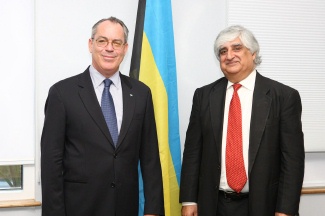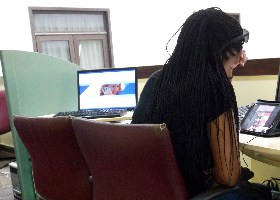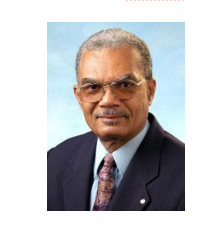Bahamas has sound economy
NASSAU, The Bahamas – The Bahamas came out on top of a Business Environment Survey conducted by the Commonwealth Business Council, for its sound economic policies and stable economy.
This statement was made by Dr Mohan Kaul, Director General of the Commonwealth Business Council; during a courtesy call on Deputy Prime Minister and Minister of Foreign Affairs the Hon Brent Symonette, at the Deputy Prime Minister’s Office, Goodman’s Bay Corporate Centre, Thursday, August 23.

Deputy Prime Minister and Minister of Foreign Affairs the Hon. Brent Symonette, left, and Dr. Mohan Kaul, director general of the Commonwealth Business Council, pose for an official photograph at the Ministry of Foreign Affairs on Thursday, August 23, 2007.
(BIS Photo/Tim Aylen
Dr Kaul is a candidate for the Commonwealth Secretary General post. He was appointed Director-General and Chief Executive Officer of the Commonwealth Business Council upon its establishment in October 1997.
The 2005 survey was also conducted on the economies of Trinidad and Tobago, and Jamaica.
“We did an environment survey on The Bahamas and Barbados, which showed that The Bahamas was one of the very successful stories, particularly in the last few years.
“You have really done very well in terms of changing the business perspective and making the economy a more free economy. The tourism and financial services sectors are the highlights,” he said.
Dr. Kaul said that the CBC wants to see how it can mobilize more financial resources, which are available in the market, for the benefit of The Bahamas.
“You have really done very well in terms of changing the business perspective and making the economy a more free economy,” he said. “We have not really looked at other small countries but the Caribbean countries came out better than any other Commonwealth Countries.”
The Commonwealth Business Council is open to companies based in, operating or intending to invest in one or more of the 53 Commonwealth member states. Its function is to represent interests of the private sector within the Commonwealth through its membership base. The CBC also acts as a facilitator by providing governments with input from the private sector, simultaneously providing the private sector with productive access to government.
Dr. Kaul observed that overall; Commonwealth member-countries have done much better than non-members in meeting the globalization challenge.
“If you look at all Commonwealth countries, you will see four to five percent growth rate,” he said. “So in Caribbean, we feel particularly that Bahamas and Barbados are good examples to learn from (in terms of economic achievement).”
Dr. Kaul also said that The Bahamas’ status, as “a wealth nation” by international standards does not hurt its chances of obtaining financial and technical assistance.
“It does not hurt because now, the private sector investment flows, play much more important role than actually officially developmental roles. So the important thing is to mobilize those private sector inputs and build on that.
“I think there are lot of advantages in looking at how best we can connect more to the international financial markets in Europe and the US. The whole idea is how do we connect Caribbean countries like The Bahamas more to the international financial arena,” he said.
Dr. Kaul and Deputy Prime Minister Symonette held discussions on The Bahamas economic policies regarding globalization and free trade, business and commerce and the financial services sector.



